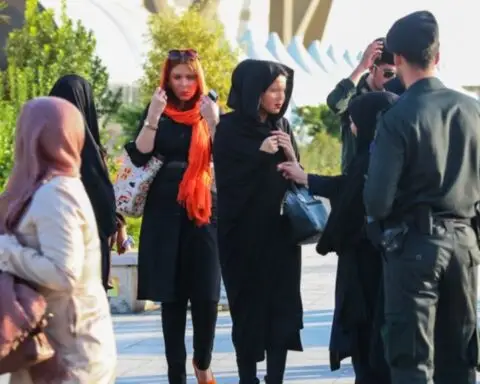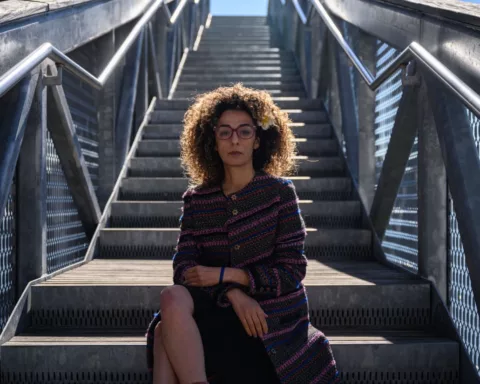The arrest of 81-year-old Akbar Khorramdin and his wife for the killing of Khorramdin’s 47-year-old son, Babak, a filmmaker, led to admissions that they had also killed a missing daughter and son-in-law.
The tragedies cast light on grave domestic crimes seemingly fueled by perceptions of honor and sexual propriety in Iranian society, as well as on laws eroding protections for potential victims of violence by a legal guardian.
The elder Khorramdin reportedly cited the “moral corruption” of his children and indicated they would have killed two surviving siblings if they hadn’t been apprehended.
Shahram Mokri, who once taught Babak Khorramdin at Iran’s Young Cinema Society, said the contradiction of the ghastly crimes and the outward normalcy of the Khorramdin family has horrified many Iranians.
“People see similarities between themselves and the characters involved in this case,” Mokri told the semiofficial ISNA news agency.
No Remorse
Local reports say the parents have expressed no remorse for the killings.
“I don’t have a guilty conscience for any [of the killings],” Khorramdin told reporters in a video posted online by Iranian news agencies, adding, “Those I killed were highly morally corrupt.”
His wife said the two had plotted together to kill their son, daughter, and son-in-law.
“I’m not sad at all. I suffered a lot because of them,” she said. “We both [planned it].”
“My husband said it and I said, ‘OK,'” she said.
Babak Khorramdin was killed in the family home in Tehran’s Ekbatan housing complex, according to the account published by Iranian media.
His father said that they first sedated their son using sleeping pills. He said his son was half-conscious and that he had to tie his feet with a bootlace before stabbing him in the chest. The couple then took their son’s body to a bathroom, where they dismembered it and stashed it in a suitcase and several bags that they later dumped in their neighborhood.
The police were called when remains were found on May 16.
Khorramdin’s mutilated body was identified through fingerprinting.

The parents reportedly confessed after the police went to their home and found evidence of the crime.
Khorramdin said they often argued with their son, an assistant professor who lived in London for several years before returning to Tehran. He said he and his wife didn’t have a day of peace because of his “harassment.”
He also reportedly said that he had killed his daughter Arezou three years ago and said she had been corrupt, including using drugs and bringing her boyfriends home. Khorramdin said he told acquaintances that Arezou had moved to Turkey.
He also allegedly confessed to killing his son-in-law, who he said was a drug trafficker, some 10 years ago with the help of his daughter Arezou and his wife.
The head of Tehran’s criminal court was quoted by the Hamshahri daily as saying that the three murders had been conducted in a similar fashion.
Both parents are in custody as the investigation continues.
Three Shocking Murders
The cold-blooded Khorramdin killings follow close on the heels of the killing of a gay Iranian man earlier this month.
Twenty-year-old Alireza Fazeli Monfared despaired over difficulties he faced due to his sexual orientation and was preparing to flee his native Iran for Turkey.
He was allegedly killed by family members before he could leave the southwestern province of Khuzestan after they accused him of dishonoring the family.
A half-brother and cousins reportedly killed Monfared and dumped his body before telling his mother where to find the corpse.
Less than a year ago, in another high-profile case, a 14-year-old girl was reportedly beheaded by her enraged father after trying to elope.
The father of Romina Ashrafi was said to have consulted with a lawyer to learn what punishment he would face before beheading her.
She had reportedly tried to elope with her boyfriend before being arrested by police and sent back to her family.
Light Sentences For Fathers Who Kill Their Children
Iran is among the world’s leading executioners for crimes ranging from murder to drug trafficking or crimes against the state. It also routinely hands out harsh punishments for sexual misconduct and homosexuality.
But Islamic laws enforced in Iran suggest that Khorramdin could face as little as three years in prison for killing his son and his daughter.
He is exempt from what is known in Iran as “retribution” law — the death penalty — since under Iran’s Islamic Penal Code, fathers and grandfathers are considered legal guardians. But if he is convicted of killing his son-in-law, he could face the death penalty, Tehran-based lawyer Mohammad Hossein Aghasi told RFE/RL’s Radio Farda.
“Regarding their son-in-law, if someone files a complaint and calls for retribution, [if he and his wife are convicted they likely] will be sentenced to [capital punishment].”
The head of the psychiatric department of the General Directorate Of Forensic Medicine of Tehran Province, Mehdi Saberi, has said those experts have not yet made a determination on the mental status of the alleged killers.
He said the two had undergone initial questioning but more testing was needed to determine their psychological state.
Sociologist Mostafa Eghlima told RFE/RL’s Radio Farda that the reasons for the gruesome murder should be identified to prevent such acts in the future.
“They say, ‘Kill him.’ What would that solve? We created these people. They weren’t [born] killers. This is a reminder for us to see what we’ve done is wrong that makes some reach such a point,” Eghlima said.
Tehran-based psychiatrist Hessam Firouzi suggested the heavily patriarchal behavior within Iranian households could be an echo of official actions with respect to public executions and other harsh punishments, as well as a notoriously nontransparent court system.
“When [leaders] issue sentences without holding public trials, execute citizens, or kill several hundred people, a father who suffers from personality disorders can believe he has the same right,” Firouzi told RFE/RL’s Radio Farda.
Outpourings On Social Media
Many Iranians — including several of Khorramdin’s former students and friends — have posted about their grief on social media, trying publicly to cope with the brutality of the case.
“The family institution is the most important refuge for Iranians,” analyst Abbas Abdi tweeted. “So everyone has been horrified by the brutal murder of Babak Khorramdin.”
Filmmaker Mokri said: “When we read about a murder that is far from us geographically, culturally…we consider it more like fiction. But, at least to me, this case was notable because I thought it is very similar to the situations we live in: a son who is a university professor, he’s successful, calm; and a father and mother who are like other fathers and mothers.”
“I can’t believe it, why you Babak?” Babak Rokni wrote on Twitter. “You were my professor and I was honored with your friendship. Why Babak? How could someone do this to you? “
London-based film critic Parviz Jahed said he used to meet Khorramdin in cultural and film circles in London.
“I heard that he missed his family and [so he] returned to Iran. And now I saw this horrible news. I can’t believe it,” Jahed wrote on Instagram. “How can a father be so brutal?”






